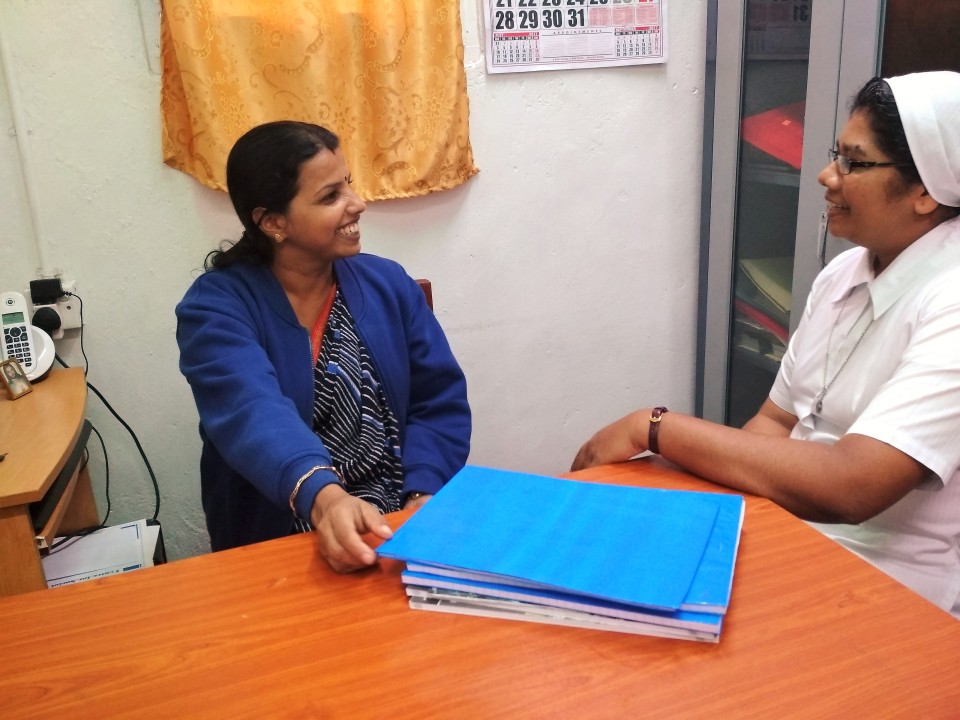Home » Hatton Writings
Category Archives: Hatton Writings
Learning to Teach English

I am Ms. Udaya, one of the facilitators at Loyola Campus- Hatton. I am really happy to share about my experience during the English training programme by Adrian Doff. It was a big opportunity for me. I really enjoyed and met so many people from India and different parts of Sri Lanka.
The training programme taught me many ways to become a good teacher. It is more valuable for me. As a teacher I am really proud of myself because of this opportunity. In the beginning, I was nervous. Everything was strange: the place, the people and the programme. I was scared to talk to the participants. I felt that the participants were highly educated and I was nowhere before them. But slowly I took courage and participated actively in the training. The participants were friendly, the sessions were participatory and I also had something to contribute in the training.
Mr. Adrian Doff taught us very well. He is British. I liked his accent and pronunciation. It was a great opportunity for me to listen to English from a native speaker. I liked his approach. It was participatory. He made us comfortable and friendly. I had the privilege to meet him personally outside the training. He encouraged me to become a good English teacher and helped me to remove fear in me.
I want to thank Loyola Campus and the Jesuit Worldwide Learning ( JWL) for this opportunity. In future I will give my best to my own plantation community as an English facilitator of Loyola Campus- Hatton.
Rajendran Udayakumar
Facilitator- Hatton
Why Loyola Campus in Hatton

Yogitha is the administrator of Center for Social Concern (CSC) and Loyola Campus Hatton. Her mother has been working both at Satyodaya, Kandy and CSC, Hatton with Fr. Maria Antony, the founder of CSC. Yogitha joined CSC in 1993 as a preschool teacher at Mountjean Estate and has been holding various positions at CSC depending on the need of the centre. Recently she was managing the centre as the coordinator in the absence of a Jesuit personnel. She loves the people and the centre. Her dedication with optimism and smile brings a lot of people to CSC. Now she is busy in recruiting new students to Loyola Campus-Hatton. Sr. Sahayamary, the Dean of Studies, Loyola Campus Hatton interviewed her for Loyola Campus Magazine. Here is the excerpt from her interview.
Question: What can you tell briefly about CSC and the work among the plantation people
Yogitha: CSC has grown. At the beginning, we started preschools only in three estates and we expanded it later to 18 estates by 2012. Afterwards the spirit of CSC was not the same. Now Loyola Campus- Hatton is a blessing for CSC to give new life to the centre.
The main aim of CSC is to empower the plantation community. Initially we gave importance to education. We started preschools and developed evening coaching centres and focused our attention on the dropout children. We also aimed the overall development of the students. We used to bring the children to the centre for reflection and skill development. CSC was publishing a monthly magazine called ‘Malai kural’, (the voice of the hill) where the students had the opportunities to share their concerns and reflections in the form of essays, poems and drawings.
As we were doing education program, we came to the realization that one of the basic issues of the plantation community was land and housing rights. So we organized programmes for the leaders of the trade unions, writers, teachers, women and the people to make them aware of the plantation situation. Through the platform ‘Kalam’ we could organize reflection meetings once a month on the burning issues of the plantation community.
Question: In your experience, what are the main challenges people face in term of education.
Yogitha: There is a deep desire on the part of the students towards higher education and there is an increase in the number of the students who go for university studies. Sadly the plantation community is neglected at every level. Still the upcountry does not have proper teachers especially in English, Maths and science subjects. So in general the students have to choose art subjects which do not provide much employment opportunities. So the plantation community remains backward in higher education.
Question: In this context, how do you estimate the relevance of Loyola Campus- Hatton?
Yogitha: The students of Hatton feel the need of English language for better job opportunities. But they are afraid to learn English. Though the children here are highly talented, the shyness or fear to learn English becomes the stumbling block towards their bright future. Many choose arts subjects. Since they fail in English, they do not get employment in the banking sector or any private sector for that matter. Government has already neglected this community.
The focus group of Loyola campus is youth. I am happy and welcome Loyola campus- Hatton to bring change in the youth of the plantation community. Already Loyola Campus has recruited staff like Udayakumari and Sinduja from the plantation community. It means that it has recognized the potentials of the community.
I do not want the Loyola campus to become like regular schools. In my opinion the schools are very rigid and traditional and their aim is to complete the syllabus. I expect the Loyola campus to be friendly with students and to provide opportunities to grow in freedom and creativity. There need to be personal guidance for students. We may have students both from Hatton town and the estates. The estate children may have a lot of hesitation and inhibition. The staff of Loyola Campus need to understand the students’ background and need to build their confidence first. Money should not be the criteria for recruitment. The poor must feel free to approach the centre for their education.
Our education should not be bookish alone. We also need to be aware that we are dealing with youth. They love to be free. So we need to include indoor games, workshops and outings in our curriculum. We need to pay attention to the overall development of the youth. When they go out of Loyola campus, they need to go with values, higher aims in life, concern and commitment towards their own plantation community, self discipline and skills to obtain a decent job. I am hopeful that Loyola Campus will bring changes in the plantation community.
Sr Sahayamary
Facilitator- Hatton
